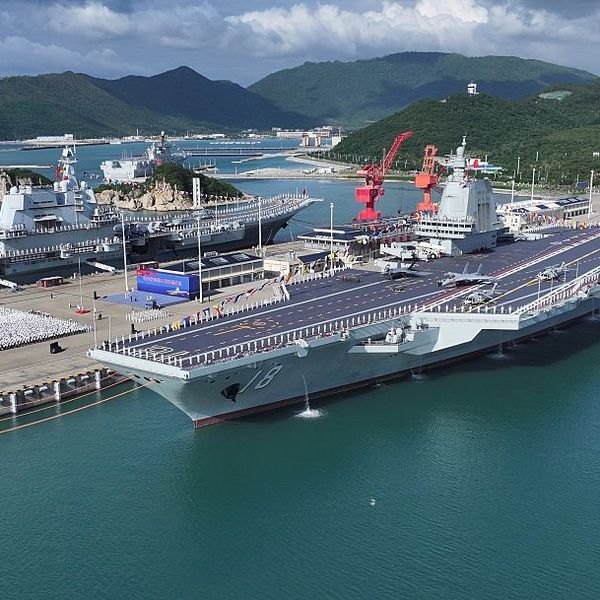Dr. Kenneth Dekleva served as a Regional Medical Officer/Psychiatrist with the U.S. Dept. of State and is currently Associate Professor of Psychiatry and Director, Psychiatry-Medicine Integration, UT Southwestern Medical Center. He is also a Senior Fellow at the George HW Bush Foundation for US-China Relations. The views expressed in this paper are entirely his own and do not represent the official views of the U.S. Government, the U.S. Dept. of State, or UT Southwestern Medical Center.
OPINION — Last week, President Biden, along with Australia’s Prime Minister Scott Morrison (whom Biden referred to as “that fella down under” at their joint press conference) and Britain’s Prime Minister Boris Johnson, signed a nuclear submarine deal (“AUKUS”). This deal allows Australia to acquire eight nuclear-powered submarines by 2040, and it also allows for intelligence sharing, and increased defense cooperation in the fields of AI and cyber-security.
This historic deal, coming off the abysmal, shameful American withdrawal from Afghanistan earlier this summer, is seen as evidence that “America is Back,” and that former President Obama’s earlier ‘pivot to Asia’ is more robust under the current Biden administration. What has been less commented on is how other nations (Japan, India, New Zealand, India, the Philippines, Indonesia, Pakistan, Iran, Myanmar, Vietnam, Thailand, North Korea, and Russia) will react to this deal? And most saliently, how will China’s President Xi Jinping respond?
AUKUS risks disrupting a delicate non-proliferation equilibrium, even more so than the 2006 US-India civilian nuclear deal. By allowing a non-nuclear power to obtain nuclear submarines, China and Russia can now compellingly make the argument that they too can sell similar technologies to their allies, such as Pakistan, Iran, Myanmar, and North Korea. There’s also the risk that other American allies in Asia - such as South Korea, Indonesia, and Japan - might desire similar technology.
The fallout between America, the United Kingdom, and France – whose $60 billion diesel submarine deal with Australia was cancelled without much advance warning – has dampened some of the political benefits of the deal. It also weakens France’s President Emmanuel Macron ahead of 2022 elections. That’s a rift that China and Russia should be expected to exploit. Just as in the Afghanistan withdrawal, a narrative now exists that America is an untrustworthy and unreliable ally.
The Cipher Brief hosts private briefings with the world’s most experienced national and global security experts. Become a member today.
Because of the long-term potential for Australia to increase its military strategic depth with nuclear submarines able to reach China (and Taiwan), could this deal increase political pressure on Xi and the CCP to invade Taiwan? This is a huge risk worthy of consideration. China will also likely increase its investments in ASW technology. America, Britain, Australia, and their allies can expect more Chinese technology theft, espionage, as well as cyber-attacks to blunt the AUKUS deal. China could also take other, more aggressive asymmetric measures as well, such as PLA naval harassment, naval quarantines, and mines.
Xi is now well-understood to be a patient, resilient, pragmatic, bold and powerful leader. Yet so far, he and senior CCP leadership have been surprisingly muted regarding AUKUS. Like any good businessman, Xi knows the old adage that “time kills all deals.” And so can future election results in America, Britain, and Australia. The delivery date for the nuclear submarines is expected to be 2040 —- a date far into the future, and close to the apex of Xi’s centennial “Chinese Dream of Rejuvenation” in 2049, when China will be a fully-fledged, leading world power.
While the impetus for this deal arose with Australia and America’s desire to push back against recent Chinese aggressiveness in its politics, trade policy, and military projection in the South China Sea, Xi must surely wonder, who was the ‘godfather’ of this deal? The normally cautious President Biden? Or rather Biden’s ‘Asia Czar,’ former President Obama’s Assistant Secretary of State for East Asian and Pacific Affairs (and author of The Pivot: The Future of American Statecraft in Asia) Dr. Kurt Campbell?
It’s quite amazing that details of the deal didn’t leak. This (and the rather muted PRC’s response) ought to also beg the question of whether the Chinese anticipated this deal, or more ominously, whether they had or have an inside source in one of the key governments involved in the deal —- a 21st-century version of China’s famed spy Larry Wu Tai Chin, who in the early 1970s, provided Chairman Mao, Premier Zhou Enlai, and the PRC leadership with key tactical and strategic details of President Nixon and then-National Security Advisor Henry Kissinger’s plans for America’s historic opening to China during 1971-1972.
Go beyond the headlines with expert perspectives on today’s news with The Cipher Brief’s Daily Open-Source Podcast. Listen here or wherever you listen to podcasts.
Xi and the CCP will likely not act impulsively, but will rather formulate a careful, long-term strategy to blunt this deal. Xi and Biden have met multiple times since 2011, when Xi was both Vice-President and later, President of China. In 2013, Xi referred to Biden as “an old friend,” whereas Biden replied, “complex relationships require sustained, high-level engagement.” And now Biden has built upon those successful, bipartisan portions of President Trump’s earlier pushback against an aggressive, assertive China, with Xi as the most powerful Chinese leader since Mao. But President Biden, Prime Minister Johnson, and Prime Minister Morrison might do well to recall Xi’s 2014 statement, that “in the final analysis, it is for the people of Asia to run the affairs of Asia, solve the problems of Asia, and uphold the security of Asia.” In Asian strategy, Xi is playing Go, while America has often struggled to play Checkers.
To understand Xi and his strategic thinking, President Biden and his leadership might appreciate Professor David Lai’s 2004 US Army War College monograph, “Learning From The Stones: A GO Approach To Mastering China’s Strategic Concept, Shi,” in which he writes: “there is no western equivalent to the concept of shi” —- [explained as] the alignment of forces, the propensity of things, or the potential born of disposition … that only a skilled strategist can exploit to ensure victory over a superior force. Similarly, only a sophisticated assessment by an adversary can recognize the potential exploitation of shi.” For President Xi, AUKUS is a mere beginning, not an endpoint. And thereby for President Biden, caution, rather than elation, is warranted.
Read more expert-driven national security insight, perspective and analysis in The Cipher Brief














